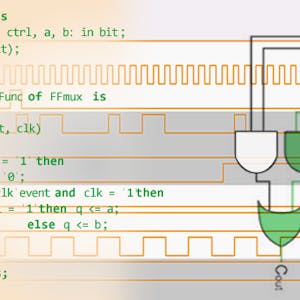This course, "Digital Systems: From Logic Gates to Processors," offers a comprehensive exploration of modern digital system design from a practical perspective. Emphasizing the system's design over the supporting electronics, this course equips learners with a set of design methodologies and educational computer-aided design tools. Students will delve into the description of digital systems using high-level languages such as VHDL and gain a deep understanding of computer operation at the most fundamental level.
Key topics include the design of medium complexity digital systems, understanding high-level language descriptions, and basic computer architecture. The course culminates in the design of a simple processor, providing a transversal example of a complex digital system and introducing fundamental computer architecture terms such as the instruction set, microprograms, and microinstructions.
Certificate Available ✔
Get Started / More Info
Digital Systems: From Logic Gates to Processors provides a comprehensive journey into the modern design of digital systems, covering essential topics such as binary numeration systems, combinational circuits, VerilUOC_Desktop tools, VHDL introduction, sequential circuits, finite state machines, and physical implementation strategies.
Module 1: All you need to know to start the course
Module 2: Previous knowledge: A review
Module 3: What Digital Systems are?
Module 4: Combinational Circuits (I)
Module 5: VerilUOC_Desktop tools
Module 6: Combinational circuits (II)
Module 7: Arithmetic components + Introduction to VHDL
Module 8: Sequential circuits (I)
Module 9: Sequential circuits (II)
Module 10: Sequential circuits III and Finite State Machines
Module 11: Implementation of digital systems
Module 12: COURSE SUMMARY AND FAREWELL
Battery Technologies is a comprehensive Specialization focusing on various battery types, their applications, and management in electric vehicles scenarios.
Powering your Home Projects with Raspberry Pi enables beginners to create functional prototypes and custom hardware with a Raspberry Pi, from basic setup to designing...
This course offers the opportunity to design and build a mobile surveillance system using Internet of Things principles. Gain practical experience and apply knowledge...
Remote Sensing Image Acquisition, Analysis and Applications is an in-depth course covering the fundamentals of remote sensing, image analysis, and computational...